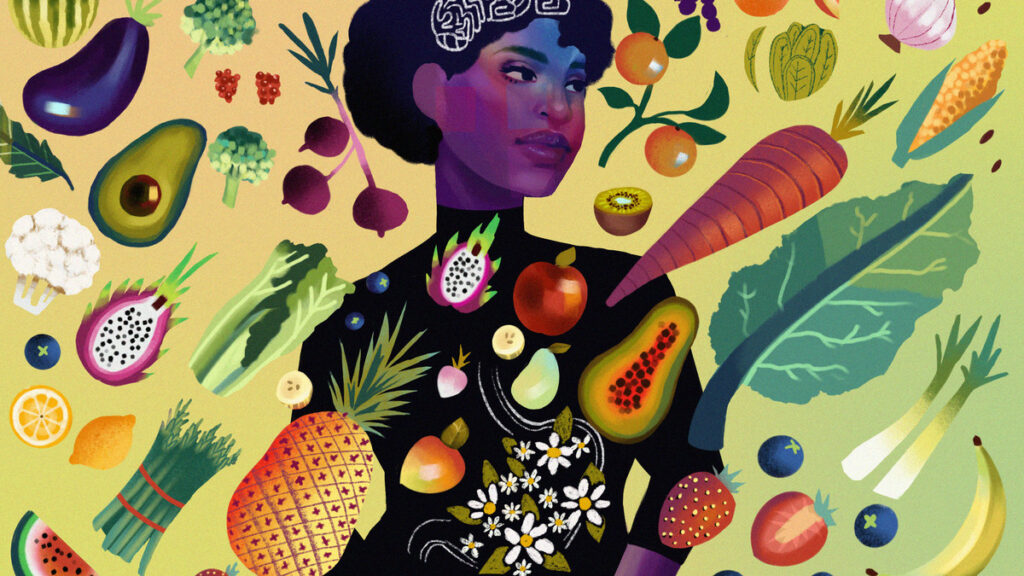For Black Americans, specifically those who are the descendants of enslaved Africans, soul food is more than just cuisine, it’s a cornerstone of culture and community. In many Black families, recipes are passed down the way old-wives tales, cars, or cast-iron skillets are. For many Black Americans, soul food is the meeting place, where, regardless of the occasion, family and friends can find common ground. However, there’s an ongoing and growing concern about the impact of the traditional soul food diet on health outcomes in Black communities.
While soul food boasts delicious dishes like fried chicken, mac and cheese, and sweet potato pie, these meals often rely heavily on fried foods, added sodium and sugars, and processed meats. This alignment with the broader Standard American Diet (SAD) has been linked to a higher risk of chronic health conditions like obesity, heart disease, and type 2 diabetes in the Black community.
The data tracks, painting a concerning picture. Black adults in America have a higher prevalence of obesity and heart disease compared to white adults. In a 2022 study conducted by the CDC, Black American women had the highest rates of obesity or being overweight compared to other groups, with about 4 of 5 Black women being considered overweight of obese. They are also disproportionately affected by type 2 diabetes, a condition with strong ties to diet and lifestyle.
Source: CDC 2022 study. Health United States, 2019. Table 26. https://www.cdc.gov/nchs/data/hus/2019/026-508.pdf
Source: CDC 2022 study. Health United States, 2019. Table 26. https://www.cdc.gov/nchs/data/hus/2019/026-508.pdf
So, what’s behind this disparity? Socioeconomic factors have always played a significant role. In the case of Black Americans, there is a historical context to consider. During times of slavery and segregation, soul food provided sustenance and a sense of comfort for Black families facing limited resources. The focus on affordable, calorie-dense foods proved necessary for survival. However, in today’s world, this dietary pattern can contribute to health problems.
Today, Black neighborhoods often have limited access to fresh fruits, vegetables, and grocery stores with healthy options. Conversely, fast food restaurants and convenience stores often target low-income, consequently, Black neighborhoods, peddling unhealthy processed fare, are often more readily available. A 2016 study showed that there was a positive association between fast-food access and the area’s poverty rate. The average distance to fast food was 3.56 miles closer to Black neighborhoods than neighborhoods where the majority of residents were above the poverty line. This creates a situation where healthy eating becomes a challenge.
The good news is that there’s a movement towards healthier soul food. Many Black chefs and community leaders are advocating for incorporating healthier cooking methods, using leaner proteins, and including more vegetables into soul food classics. There’s also a growing emphasis on food justice initiatives, aiming to bring fresh produce and grocery stores to underserved communities.
Soul Food Gets a Makeover: Black Chefs Dish Up Healthier Takes on Tradition
To bridge the gap between the cultural relevance of soul food and the impact on health, Black chefs are reimagining soul food classics with a focus on wellness, creating a cuisine that nourishes both body and soul.
Innovation is also on the menu. Chef Bryant Terry has become a pioneer in vegan soul food, proving that plant-based alternatives can be just as delicious and satisfying. His creativity extends beyond replacing meat; he highlights under-utilized ingredients like black-eyed peas and collard greens, showcasing the inherent health benefits of soul food traditions.
This movement isn’t just about individual chefs. The Association of Black Women Physicians created the “Healthier Traditions Cookbook,” offering Black communities recipes specifically designed to promote wellness These efforts acknowledge the importance of soul food in Black culture while empowering communities to make informed dietary choices.
Black chefs are breathing new life into soul food by making it healthier, not sacrificing its cultural significance. Their innovative spirit ensures that soul food can continue to be a source of comfort, connection, and, most importantly, well-being for generations to come. And for many Black Americans, veganism is the natural next step as more become educated on food choices and how to eat for both culture and genetics.
Black Vegans Take Center Plate: A Growing Movement Rooted in Social Justice
For many, veganism conjures images of tofu and kale. But in Black communities across America, a different kind of vegan movement is taking root, one that blends plant-based eating with social justice activism.
Data suggests Black Americans are the fastest-growing vegan demographic in the US, with estimates suggesting upwards of 8% identifying as vegan or vegetarian [Essence: Black Americans Are Going Vegan At A Higher Rate Than Anyone Else. Here’s Why And How You Can Do It Too].
But Black veganism goes beyond just personal well-being. It’s a movement deeply connected to issues of race and access. Historically, Black communities have often been relegated to “food deserts,” lacking access to fresh produce and grocery stores. Veganism becomes a form of empowerment, a way to take control of one’s diet and health, even in challenging circumstances.
Furthermore, Black vegans draw parallels between the exploitation of animals in factory farms and the systemic oppression faced by Black people throughout history. Veganism becomes a way to fight for liberation on all fronts.
This movement isn’t without its challenges. Finding affordable and culturally relevant vegan options can be difficult. But Black entrepreneurs are stepping up, opening vegan soul food restaurants and creating plant-based versions of traditional dishes.
The key takeaway? Soul food can evolve alongside the times. By embracing healthier preparations and prioritizing access to nutritious options, Black communities can enjoy their cultural dishes while promoting better health outcomes for future generations.

